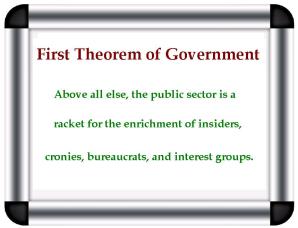I have repeatedly opined that big government enables corruption.
And I have also asserted over and over again that big government is a racket for the benefit of insiders.
So you can understand why I get upset when the rich and powerful use the coercive power of government to line their pockets at the expense of ordinary taxpayers.
Now I have a new reason to be angry.
Reporting for the New York Times, Neil MacFarquhar describes a scandal involving Mississippi bigwigs feeding at the public trough.
John Davis, who served as executive director of the Mississippi Department of Human Services under former Gov. Phil Bryant, pleaded guilty to both federal and state charges of embezzling federal welfare funds. Millions of dollars were transferred to friends and relatives, court documents say. According to a lawsuit filed by the state in May, around $5 million was diverted to Ted DiBiase, a flamboyant retired wrestler once known as “The Million Dollar Man,” and two of his sons… Much of the money went to fictitious services, bogus jobs, first-class travel arrangements and even one son’s stay at a luxury rehab center in Malibu, Calif., that cost $160,000, the suit claims. Similarly, the state claims that Marcus Dupree, a former high school football phenom and professional running back, who was paid to act as a celebrity endorser and motivational speaker, did not perform any contractual services toward the $371,000 he received to purchase and live in a sprawling residence with a swimming pool and adjacent horse pastures in a gated community. Mr. Favre, who earned more than $140 million in his Hall of Fame career, was paid $1.1 million for speeches he never gave, the suit said. He also orchestrated more than $2 million in government funds being channeled to a biotechnology start-up in which he had invested, according to the suit. …The case follows a state audit released in May 2020 suggesting that as much as $94 million of TANF funds might have gone astray.
Sounds like a typical story about big government and corruption, right?
That’s certainly true, but some of our friends on the left argue that it is also evidence that Bill Clinton’s welfare reform backfired.
Experts said the fraud was rooted in changes enacted in such programs in 1996, when cash benefits paid to poor families were replaced by block grants issued to states.
Since I have defended Clinton’s welfare reform (along with some of his other good policies), the above excerpt caught my attention.
So I looked for more information.
In a piece for the American Enterprise Institute, Angela Rachidi explains the underlying issues.
A scandal involving former NFL quarterback Brett Favre and the federal welfare program Temporary Assistance for Needy Families (TANF) exploded…following new revelations that Mississippi officials, including the former governor, misdirected federal TANF money to enrich themselves, their celebrity friends, and other well-connected individuals. …the scandal draws attention to the TANF program. Critics have partly blamed the welfare reform law from 1996, which created TANF, for allowing such fraud. …Instead of an entitlement where government officials distribute money to all eligible people, TANF is a block grant provided… As awful as this scandal is, the fraud and abuse on display in Mississippi is not unique to TANF and not caused by its block grant structure. The Government Accountability Office (GAO) estimated that from 2015–2017 the annual average amount of Supplemental Nutrition Assistance Program (SNAP) benefits (or food stamps) “trafficked,” meaning retailers taking a fraudulent profit, was $1.2 billion. The GAO also found that improper payments in Medicaid, including payments for services not provided, totaled $36.7 billion in 2017. Earlier this month, the Department of Justice charged a nonprofit organization in Minnesota with a $250 million scheme that took federal pandemic-relief money earmarked for a child nutrition program and instead pocketed the funds.
In other words, corruption is an inherent part of government programs, whether the money is distributed as block grants or sent directly to recipients.
But not all government spending is created equal. Some ways of spending money do more damage than other ways of spending money.
Ms. Rachidi points out that welfare reform produced good results. I don’t know if it saved money for taxpayers, but it led to progress as measured by variables such as labor force participation and child poverty.
None of this excuses what happened in Mississippi, but the context is important. Welfare reform, which created TANF, transformed a broken entitlement program—Aid to Families with Dependent Children—into a more effective system that gives states flexibility to address the underlying causes of poverty, including limited employment and unmarried parenthood. These reforms have significantly reduced dependence on cash welfare and increased employment among single mothers, which helped dramatically lower child poverty over the past two decades.
The obvious takeaway, as I pointed out back in 2015, is that we should we should be expanding on Bill Clinton’s success by replacing other federal entitlements with block grants.
The federal government maintains a Byzantine maze of redistribution programs, so there are lots of opportunities for progress. Medicaid is an obvious example, along with food stamps. Especially since both programs are riddled with fraud.
P.S. Unsurprisingly, Joe Biden wants to move in the wrong direction.
P.P.S. In my libertarian fantasy world, the federal government would have neither entitlements nor block grants. That also happens to the world envisioned by America’s Founders (and the reality Americans enjoyed up until the 1930s).




